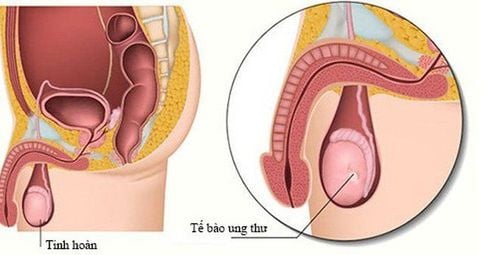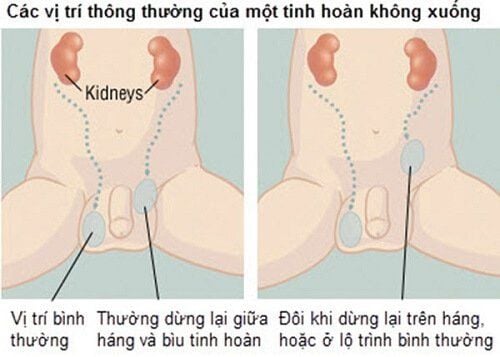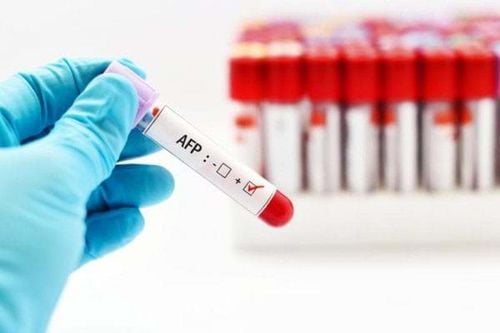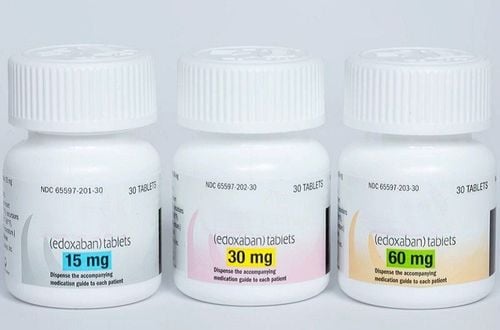This is an automatically translated article.
This article is written by doctors of Internal Oncology Department, Vinmec Times City International General Hospital.Testicular cancer is mostly curable if caught early and even when detected at a later stage. This article would like to provide you with information related to germ cell tumors in the testicles.
1. Germ cell tumors in men can develop in different parts of the body
Most testicular cancers develop in sperm-producing cells called germ cells or germ cell tumors. Germ cell tumors in men can develop in several other parts of the body:Testicles, which are the most common site. The back of the abdomen near the spine, is called the retroperitoneum. The central part of the chest between the lungs, called the mediastinum. The lower part of the spine. A small gland in the brain called the pineal gland (Very rare).

Hầu hết ung thư tinh hoàn phát triển trong các tế bào có chức năng sản xuất tinh trùng
The number of cases of testicular cancer has increased over the past 40 years for unknown reasons. However, the rate of increase has slowed down recently. The mortality rate also gradually decreased from 1990 to 2014.
It is estimated that there will be 410 deaths from this disease in the US this year. These deaths are caused by cancer that has spread from the testicles to other parts of the body and cannot be effectively treated with chemotherapy, radiation, and/or surgery, or complications from the treatment.
In our country, although there are no exact statistics on the annual incidence of testicular cancer, we only know that this is not a common cancer in men. Therefore, early symptoms and signs of disease are also easy to ignore.
The 5-year survival rate for men with testicular cancer is 95%. This means that 95 out of 100 men diagnosed with testicular cancer will live at least 5 years after diagnosis. This rate is highly dependent on the stage of the disease.
Survival rates are higher for men diagnosed with early-stage cancer and lower for men with later-stage cancer. For men whose cancer has not spread beyond the testicles (Stage 1), the survival rate is 99%. About 68% of men are diagnosed at this stage.
For men whose cancer has spread to the lymph nodes in the back of the abdomen, called retroperitoneal lymph nodes, the survival rate is about 96%. But it also depends on the size of the lymph nodes. For men whose cancer has spread beyond the testicles to areas beyond the retroperitoneal lymph nodes, such as the lungs or other organs, the survival rate is 74%. About 11% of testicular cancers are diagnosed at this stage.
2. Factors that increase the risk of developing testicular cancer
It should be noted that the cause of testicular cancer has not been found.Age . More than half of men are diagnosed with testicular cancer between the ages of 20 and 45. However, men of all ages can get it, including men in their teens and early teens. age 60. Testicle ectopic. An undescended testicle is a condition in which the testicles do not migrate, meaning that one or both testicles do not descend into the scrotum before birth as they should. Men with this symptom have an increased risk of testicular cancer. This risk can be reduced with surgery to correct the condition before puberty. Doctors recommend surgery for this condition between the ages of 6 months and 15 months to reduce the risk of infertility. Because undescended testicles are often diagnosed at a young age, many men don't know they have it. Family history. A man who has a close relative, especially a brother, with testicular cancer has an increased risk of testicular cancer. Personal history. Men who have cancer in one testicle have an increased risk of developing cancer in the other testicle. It is estimated that 2 out of every 100 men with testicular cancer will develop cancer in the other testicle. Race . Although men of any race can get testicular cancer, white men are diagnosed with testicular cancer more often than men of other races. Testicular cancer is rare in black men. However, black men with testicular cancer are more likely to die of the cancer than white men, especially if the cancer has spread to the lymph nodes or other parts of the body when diagnosed. Human immunodeficiency virus (HIV). Men with HIV or with acquired immunodeficiency syndrome (AIDS) caused by HIV have a higher risk of developing the syndrome.

Các khối u tế bào mầm ở nam giới có thể phát triển tại một số bộ phận khác của cơ thể
3. Symptoms of testicular cancer
A painless lump or swelling on one of the testicles. If detected early, the tumor is only the size of a pea, but can grow much larger. Pain, discomfort or numbness in the testicles or scrotum, swelling or no swelling. A feeling of heaviness in the scrotum. For example, one testicle may become harder than the other. Or testicular cancer can cause the testicles to grow larger or smaller. Dull pain in the lower abdomen or groin Fluid accumulation in the scrotum Soft or growing breasts. Although rare, some testicular tumors produce hormones that cause chest pain or breast tissue growth, a condition called male mammary gland hyperplasia. Lower back pain, shortness of breath, chest pain, and bloody sputum can be symptoms of later stage testicular cancer. Swelling of one or both legs or difficulty breathing from a blood clot could be a symptom of testicular cancer. A blood clot in a large vein is called a deep vein thrombosis. A blood clot in an artery in the lungs is called a pulmonary embolism and makes breathing difficult. For some young or middle-aged men, developing a blood clot can be the first sign of testicular cancer. Many of the symptoms and signs of testicular cancer are similar to those caused by other benign conditions:Change in size or a lump in the testicle
A cyst develops in the epididymis. The epididymis is a small organ attached to the testicle made up of coiled tubes that carry sperm out of the testicle. Enlargement of blood vessels from the testicles. Accumulation of fluid in the membrane surrounding the testicle or hydrocele An opening in the abdominal muscle called a hernia. Pain
Infection . An infection of the testicles is called orchitis. Infection of the epididymis is called epididymitis. If an infection is suspected, the patient may be prescribed antibiotics. If antibiotics don't solve the problem, more testing is needed to make sure you don't miss a testicular cancer. Twisted. If you are concerned about any changes you experience, consult your doctor. Your doctor will ask how long the condition has been going on and how often you have these symptoms. This to help find the cause, is called a diagnosis.
If cancer is diagnosed, relief of symptoms remains an important part of cancer care and treatment, often starting soon after diagnosis and continuing throughout treatment. See your health care provider and consult a specialist if you have any of the above symptoms.
Vinmec International General Hospital is one of the hospitals that not only ensures professional quality with a team of leading medical doctors, modern equipment and technology, but also stands out for its examination and consultation services. comprehensive and professional medical consultation and treatment; civilized, polite, safe and sterile medical examination and treatment space. With testing, ultrasound, and X-ray techniques for accurate results, doctors will base and offer a scientific treatment regimen, along with the cooperation of the patient, the treatment will be more progressive. good development.
Please dial HOTLINE for more information or register for an appointment HERE. Download MyVinmec app to make appointments faster and to manage your bookings easily.
Source: Update 2019












